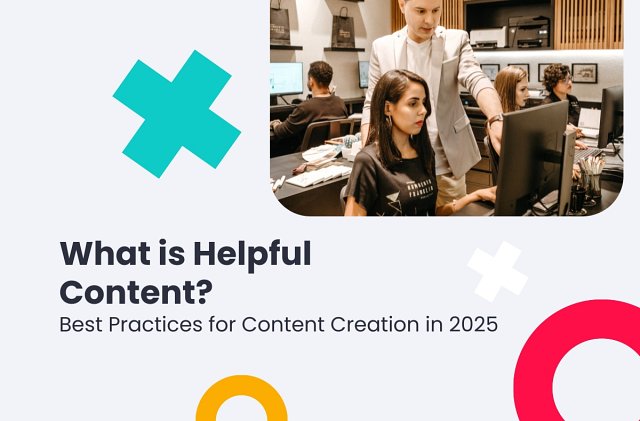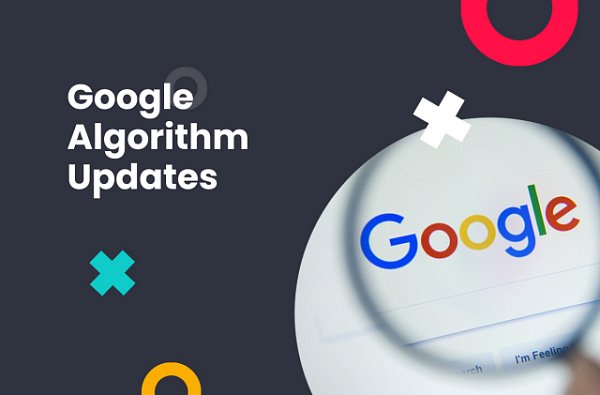(11 min. read)

Table of Contents
- What is Google Helpful Content System?
- Google Helpful Content Updates
- August 2022 Helpful Content System Update
- December 2022 Google Helpful Content Update
- September 2023 Google's Helpful Content Update
- March 2024 Core Update
- How to create helpful content?
- What to do with unhelpful content?
- Achieve High SERP Rankings by Creating Helpful Content
What is Google Helpful Content System?
Google’s Helpful Content system is a framework introduced to make sure that high-quality, user-focused content receives the visibility it deserves in search results. At its core, this system uses a set of machine learning models designed to identify content that appears to have been primarily created to help users, providing valuable information in a satisfying, easy-to-consume manner. This approach contrasts sharply with content that is overly optimized for search engines at the expense of real user engagement.
The system evaluates various factors such as the depth of information provided, the expertise behind the content, and its overall usefulness to the reader. Content should be unique and provide an original perspective beyond schematic, AI-generated answers to common questions - case studies, real-life examples, research, and analyses are highly recommended. Content that meets these criteria tends to rank higher, thereby encouraging creators to produce more thoughtful, informative, and engaging materials.
The emphasis on helpful content has been further underscored by the recent March 2024 Core Algorithm Update, which implemented the system into the core algorithm and refined the parameters for assessing content quality. This update has heightened the importance of creating content that not only ranks well but also genuinely enriches the user's search experience.
By focusing on the user's intent and providing thorough answers to their queries, creators can align more closely with Google's vision for a more helpful and informative web.
Google Helpful Content Updates
Google's initiative to elevate the quality of content on the internet has seen multiple updates and refinements since its inception. These updates form a timeline of Google's commitment to enhancing user experience by promoting content that is genuinely useful and demoting low-quality, manipulative content. Here's a breakdown of the major updates to the Google Helpful Content System:
August 2022 Helpful Content System Update
The initial rollout of the Helpful Content System in August 2022 marked a significant turning point in content evaluation. This update introduced a machine-learning model designed to identify content that truly assists searchers, distinguishing it from content that is created primarily for ranking well in search results.
The focus was on rewarding "people-first" content, where value to the reader is paramount, and content serves a clear purpose without feeling SEO-driven or superficial.
December 2022 Google Helpful Content Update
Building on the initial principles set forth, the December 2022 update further refined the detection of high-quality content. This update brought the Helpful Content system across global languages, while previously it only affected English content.
The update also introduced additional factors for Google to consider when verifying content, further improving recognition of content written specifically to rank well in search engines.
September 2023 Google's Helpful Content Update
The September 2023 update to the Helpful Content system revised the original mention of prioritizing content written “by people, for people”, leaving only the “for people” part in their guidelines. What this means is that machine-generated content won’t be penalized solely for being machine-generated if it brings real value to readers.
The update also introduced penalties for hosting third-party content on your main website or your subdomains which doesn’t fit in with the main purpose of the site. The official recommendations advise website owners to block pages with such content from being indexed.
Google also highlighted that they will penalize websites that change dates of pages to make them seem fresh, while in reality the content didn’t change in any meaningful way.
March 2024 Core Update
The most recent, the March 2024 core update, integrated the Helpful Content System more deeply into Google's overall search algorithm, emphasizing the importance of content quality, usefulness for users and minimizing unoriginal content in search results.
Each of these updates has progressively built upon the foundation of creating a better, more reliable, and user-focused Google search experience. By continually adjusting and refining the Helpful Content System, Google aims to make sure that the digital ecosystem thrives on high-quality, informative, and engaging content that serves real human interests.
How to create helpful content?
Creating content that satisfies both the algorithms (bots) and human users is a fine balance of quality, relevance, and authenticity. To align with Google's Helpful Content updates, particularly the newest March 2024 core update, content creators must adopt a holistic approach that encompasses everything from the depth of information to the presentation and user experience. For more detailed recommendations, always refer to the official Guidelines on Creating Helpful Content.
Below, we provide comprehensive guidelines on crafting content that meets these criteria:
Demonstrate Expertise, Experience, Authority, and Trust (E-E-A-T)
Expertise
See to it that your content is created or reviewed by individuals with verifiable expertise in the relevant field. This can be showcased through professional qualifications, practical experience, or a demonstrated depth of knowledge in your content.
Experience
Share personal experiences and case studies that add a unique perspective to your content. This not only enhances credibility but also provides practical value to readers, making your content stand out as more authentic and engaging.
Authority
Build authority by citing reputable sources, linking to relevant research, and maintaining a consistent record of high-quality publications. Authority is also enhanced by peer reviews or mentions from other authoritative figures in the industry.
Trust
Secure user trust by being transparent about your sources and the accuracy of your information. Include clear disclaimers where applicable, and always strive for honesty and integrity in all published content.
Focus on User-Centric Content
Relevance to Audience
Understand and address the specific needs and questions of your target audience. Tailor your content to answer their queries comprehensively and clearly.
Engagement and Value
Create content that is engaging, easy to read, and visually appealing. Use well-structured text with headings, bullets, and images to break up text and make complex information easier to digest.
User Intent
Align your content with the intent behind users' searches. Whether they are looking to learn, solve a problem, or make a purchase, your content should provide a direct, valuable solution.
Avoid Clickbait and Distractions
Clickbait
Avoid misleading headlines that promise more than the content delivers. Titles should be honest and accurately reflect the depth and nature of the content.
Ads and Pop-Ups
Minimize distractions such as intrusive ads or unnecessary pop-ups that can detract from the user experience and lead to higher bounce rates.
Emphasize Content Authorship and Transparency
Clear Authorship
Identify authors and contributors clearly to establish credibility. Include bios or links to professional profiles where possible.
Transparency
Be open about the purpose of your content and any commercial interests that might influence its creation. Transparency fosters trust and reliability.
Google vs. AI Generated Content
As artificial intelligence becomes increasingly sophisticated, AI-generated content has become more prevalent across the web. Google's stance on AI-generated content is pragmatic and focused on the overall value and accuracy of the content, regardless of its origin.
The primary concern for Google is whether the content is helpful, reliable, and serves the user's intent. Consequently, AI-generated content is not inherently penalized or favored by Google's algorithms; rather, its impact on search rankings is determined by its quality and alignment with the best practices of content creation as outlined in Google's Helpful Content updates.
Google's Perspective
Google evaluates AI-generated content on the same criteria as human-generated content. This means the content must demonstrate expertise, authority, and trustworthiness, and it must satisfy user intent comprehensively. If AI-generated content manages to meet these criteria, it can rank well.
However, Google has expressed concerns about the potential for AI to generate content that mimics these qualities superficially without truly providing value. This could lead to content that is technically competent but lacks depth, original insights, or the nuanced understanding that human expertise brings.
Recommendations for AI-Generated Content
To make sure that AI-generated content performs well in search rankings, it is crucial to implement human oversight and editing. Here are a few guidelines:
- Human Oversight: Every piece of AI-generated content should be reviewed, fact-checked, and possibly edited by a human with relevant expertise. This helps the content meet high standards of accuracy, depth, and engagement.
- Enhancing AI Content: Use AI as a tool to draft initial content, but enrich it with human experiences, personal insights, and advanced analysis that AI cannot replicate on its own.
- Alignment with User Intent: Adjust AI-generated content to more closely match the specific needs and queries of the target audience, making sure that it is not just accurate but also genuinely useful.
- Transparency: Consider disclosing the use of AI in content creation when it significantly influences the nature of the content. Transparency can mitigate any potential trust issues with users and align with Google’s emphasis on authenticity and reliability.
By combining AI’s capabilities with human expertise and ethical guidelines, content creators can leverage the best of both worlds. AI can increase efficiency and help scale content production, but human involvement is essential to guarantee that the content remains valuable.
What to do with unhelpful content?
Unhelpful content can detract from the overall quality of a website and negatively impact its search rankings. Google’s Helpful Content System and subsequent updates aim to demote such content, making it crucial for content managers to address issues proactively. There are several strategies to consider when dealing with unhelpful content, each suitable for different scenarios:
Improve and Update Content
When to Use: Content that is outdated, superficial, or not thoroughly answering the user's query should be improved. This approach is ideal for pieces that have a solid foundation but lack comprehensive details or current information.
How to Implement:
- Add Fresh, Relevant Information: Update statistics, incorporate recent developments, and include new insights to make the content timely and more useful.
- Enhance Depth and Quality: Expand sections that are underdeveloped, add expert quotes, and provide deeper analysis to increase the content's value.
- Optimize for Current SEO Best Practices: Align the content with the latest SEO guidelines, focusing on natural language, user intent, and keyword relevance without over-optimization.
- Improve User Experience: Ascertain that the content is mobile-friendly, improve readability by adjusting the layout, and enhance visual elements.
Redirect Content
When to Use: Use redirection when deleting low-quality content that still receives some search traffic or has valuable backlinks. Redirecting helps preserve link equity and guide users to more useful, high-quality content.
How to Implement:
- Implement 301 Redirects: Redirect the old URL to a more relevant page that offers similar or better information.
- Consolidate Content: If multiple articles cover the same topic superficially, merge them into a single, comprehensive guide and redirect the old articles to the new one.
Remove Content
When to Use: Content that is misleading, incorrect, or so out of date that it cannot be salvaged should be removed. This is also appropriate for content that no longer aligns with your brand’s goals or values, generates very little traffic and impressions, and has no valuable backlinks. Keep in mind, this is a last-resort solution.
How to Implement:
- Use “Noindex”: If you want your users to still be able to access the content, consider adding a noindex tag to the page and updating your sitemap to exclude it.
- Delete Entirely: Simply remove the page from your website. A 404 error response tells Google that a website is deleted, but it may try re-crawling the URL at a later date. To permanently remove the URL from indexing, use a 410 redirect.
Achieve High SERP Rankings by Creating Helpful Content
The key to achieving high search engine rankings lies in the creation of high-quality, user-centric content. Google's ongoing updates, including the Helpful Content System and its iterations, underscore the importance of content that serves the user's needs first and foremost. Here's a concise summary of how to craft content that not only satisfies search engines but also genuinely engages and assists your audience:
- Emphasize E-E-A-T: Focus on demonstrating Expertise, Experience, Authority, and Trust in every piece of content you produce. Utilize knowledgeable authors, cite credible sources, and make sure all information is accurate and up-to-date.
- Prioritize User Experience: Develop content that is directly aligned with user intent. Whether users are seeking information, looking to make a purchase, or solving a problem, your content should provide a clear, comprehensive, and engaging solution.
- Update Regularly: Keep your content fresh and relevant. Regular updates to reflect new information, changes in the industry, or evolving user needs are crucial. This not only maintains the accuracy and helpfulness of your content but also signals to Google that your site is a current and authoritative source.
- Manage Unhelpful Content: Audit your site regularly for outdated, inaccurate, or superficial content. Decide whether to improve, update, remove, or redirect each piece based on its current value and potential impact on user experience and SEO.
- Use AI Ethically: If employing AI to assist with content creation, make certain it is supervised and enhanced by human expertise. Transparency about AI's role in content creation can also help maintain trust with your audience.
- Avoid SEO Manipulation: Steer clear of practices that aim to trick search algorithms, such as keyword stuffing or deceptive clickbait. Instead, focus on creating genuinely engaging and informative content.
- Responsive and Accessible Design: Be certain your content is easily accessible and readable on all devices, enhancing the overall user experience and supporting SEO efforts.
By adhering to these principles, you can significantly increase your chances of achieving high SERP rankings. The focus on creating helpful, user-centric content not only aligns with Google’s guidelines but also builds a loyal audience base and drives sustainable, long-term success in search engine optimization.



